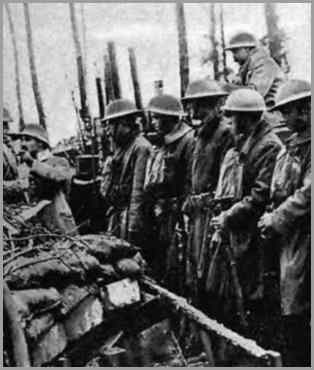In
France
Feb 20, 1918
Made a money order out to Helen for the sum of $40 which cost only $15
to mail same. Wrote to M Neal and Helen.
Feb 24, 1918
All regiment attended Mass at beautiful church in Luneville.
Feb 26, 1918
Received two letters from Helen dated Jan 14th announcing Bessie Kelly's
birthday. Received the letters just as I was detached to the First Battalion
for signal work. Left Luneville.
Mar 2, 1918
Had two meals and they were sure small.
Mar 3, 1918
Of course on Sunday, as usual, I had to work and became involved in the
war because the game sure is good and sure is exciting and the first day
I passed under German fire. Passed a German soldier's grave about one
mile and a half behind front line trenches.
Mar 4, 1918
A large snowstorm and frequent firing of canons which fell very close
to our signal station. Found a shell that never exploded fell near the
road.
Mar 5, 1918
On the evening of this day I received a letter from Edg. Gilchrist Sgt.
Company A Officers Training School.
(Click here to visit
http://www.hourigan.com/~69thny/rouge_bouquet.htm
where the tragic events of March 7, 1918 are recounted.)
Mar 7, 1918
Life saved by being switched from Rocray(?) to Chausildes(?) and two killed.
E. Kearney and Hearvey - 20 dead - 1 lieutenant
Mar 11, 1918
One Polack from drafted army shot for desertion at 8:30 am
Mar 13, 1918
Wrote a letter to Helen. Very soft hearted one. Eleven months in the service.
Mar 14, 1918
Boche (Germans) play a little music with their large guns but no damage
amounting to anything. One fellow shot through the muscle of his arm.
Company K boys. My 15th day in the trenches and everything the same as
ever. Sweet dreams of you Helen and of having a wonderful time.
Mar 16, 1918
No breakfast. A letter to Helen. Damp weather with the Germans busy with
their torpedo guns. Rats and cooties our worst enemies. A cootie hunt
every day. A cup of coffee and bread for dinner, stew, bread, and coffee
for supper.
Mar 17, 1918
Barrage from 4:30 am - 6:00 by the Germans. German's ammunition plane
blown up - one airplane brought down. Left Brussels and went to Ostend.
Mar 19, 1918
The Boche waited until we finished our bombardment and then they gave
us ours, breaking all our lines of communication by shooting shrapnel
and torpedoes and 150m at us and it sure was some bombardment. Rain and
very muddy evening settled down and had us uncomfortable. Bed 9:30pm.
Airplane of Boche flies along our front line trenches. By doing this he
started all the bombardment.
Mar 20, 1918
Awakened 9:45 am. Bread and coffee breakfast. The Germans are at it again
with frequent shooting starting. Go cootie hunting after sleeping without
any underpants because of these pests. Had no supper because of the Germans
sending a heavy bombardment of gas shells starting 5:30 pm and stopped
10 PM after we had fixed 20 breaks. One boy's arm shot off and many fellows
injured. The worst gas attack ever pulled off by them and many shells
bursting around my dugout. Bed 12:30 am but little sleep. Gas mask on
for 5 hours and it is no joke.
Mar 21, 1918
French and Germans have a duel bombardment. Three of our fellows carried
away (names). The gas almost blinded the whole Company K and put all the
boys in the hospital and left nobody to protect guns. Many boys of our
platoon carried away - all gassed nothing to eat for breakfast, dinner
of coffee and bread, and same for supper. A successful raid carried out
by the French bombardment yesterday. There were no German's alive when
our boys went over the top. They were all dead in their dugouts. I'm on
watch and my eyes are starting to blur. Germans sending over more gas.
I am very tired.

The 165th Infantry
at Coismare
-- March 2, 1918 --
Extracted from
Great War Locations Web site
(click
here to visit site)